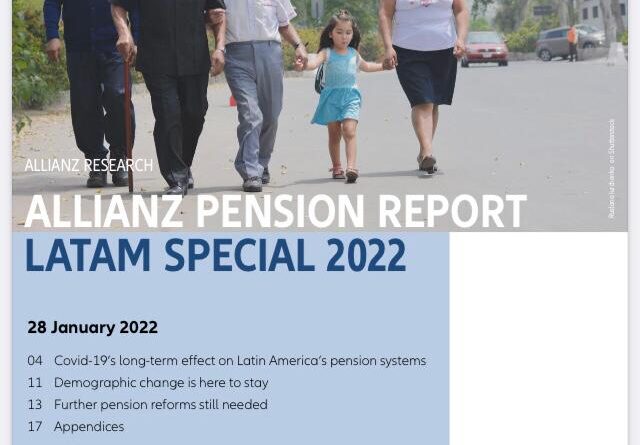Allianz Pension Report Latam special 2022
By Allianz Research
Even before the pandemic, the pension systems of most Latin American countries ranked in the bottom third in international comparison of their long-term adequacy and sustainability in our last Global Pension Report. The Covid-19 pandemic has been a double blow with respect to pension systems’ adequacy: On the one hand, rocketing unemployment rates diminished the share of the labor force in formal employment that is covered by pension schemes; on the other hand, lower contributions to pension schemes, and the fact that some governments allowed savers to tap into their retirement funds, shrank the future pension pots.
By relieving some of the pressure on the state budget to finance state welfare in the short run, the region could see three negative consequences: higher pension inequality, a higher prevalence of old-age poverty and a higher share of the elderly who depend on tax-financed state welfare in old-age in the long term. As a result, the Covid-19 crisis will cast a long shadow over Latin America in the decades to come.
In addition, life expectancy declined only temporary due to Covid-19 and will certainly resume its upward trend. Combined with declining fertility rates, this development will lead to rapidly increasing old-age dependency ratios. In Brazil, for example, the ratio is set to almost treble to 36.2%.
The results of our Allianz Pension Indicator, which assesses how prepared global pension systems are for demographic change, show that despite some recent reforms, the sustainability and adequacy of Latin America’s pension systems have hardly changed within the last two years. They still range in the lower half of the ranking, with the overall assessments ranging between 3.5and 4.3 on a scale from 1 (best) to 7 (worst) since the effects of some reforms point in different directions with respect to sustainability and adequacy, like Mexico’s decision to increase the pension benefit level, for example, or were too cautious to move the needle, like the increase of the retirement age in Brazil.
Covid-19 has affected all countries, confronting pension systems around the world with great challenges. As a result, reactions such as the early withdrawal of pension assets could be seen across the board. Latin American pension systems are at a crossroads. Therefore, the need to reform pay-as-you-go financed pension systems – making them more adequate without losing sight of long-term sustainability – is as urgent as ever.
Get the report “here“











